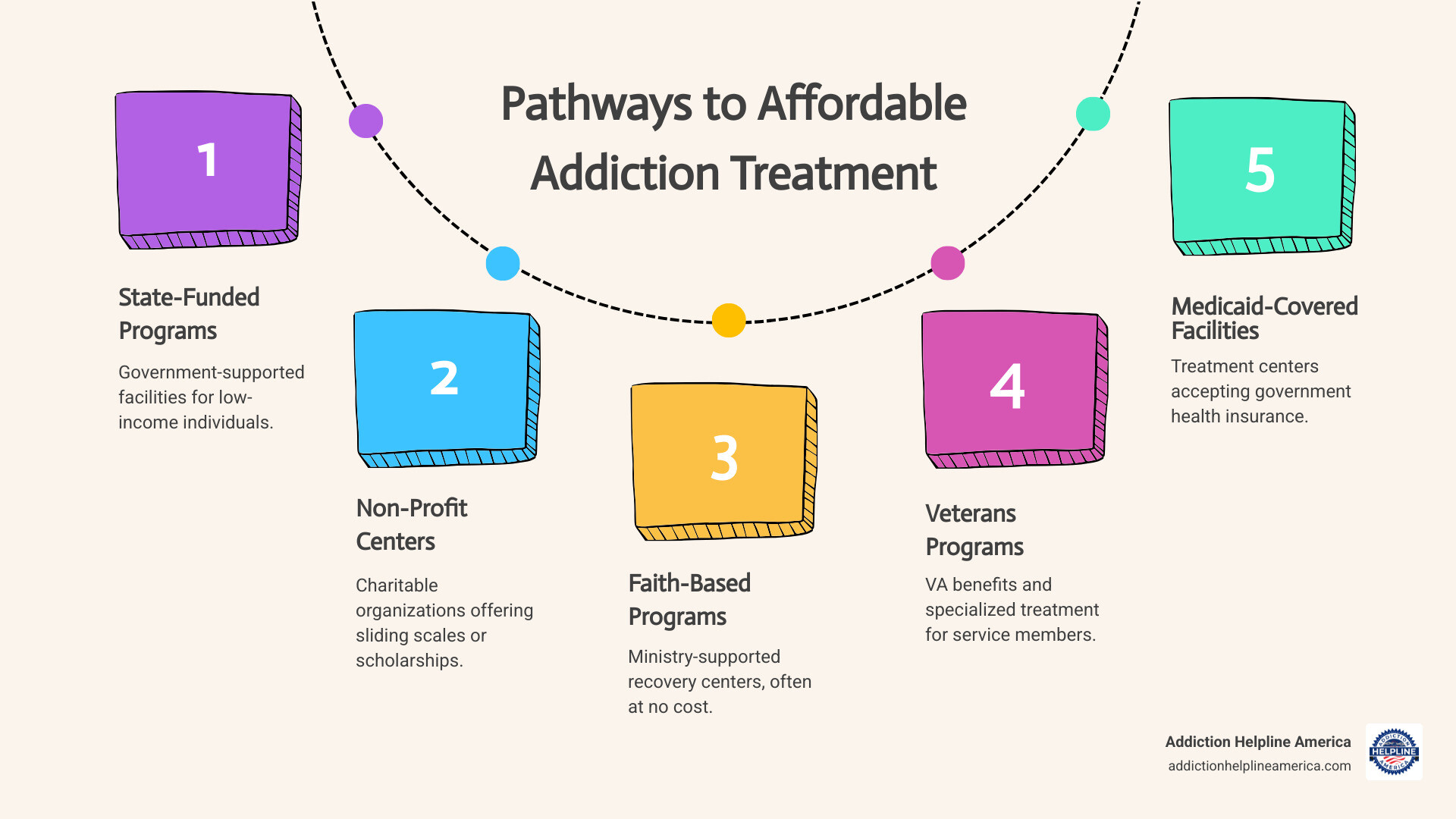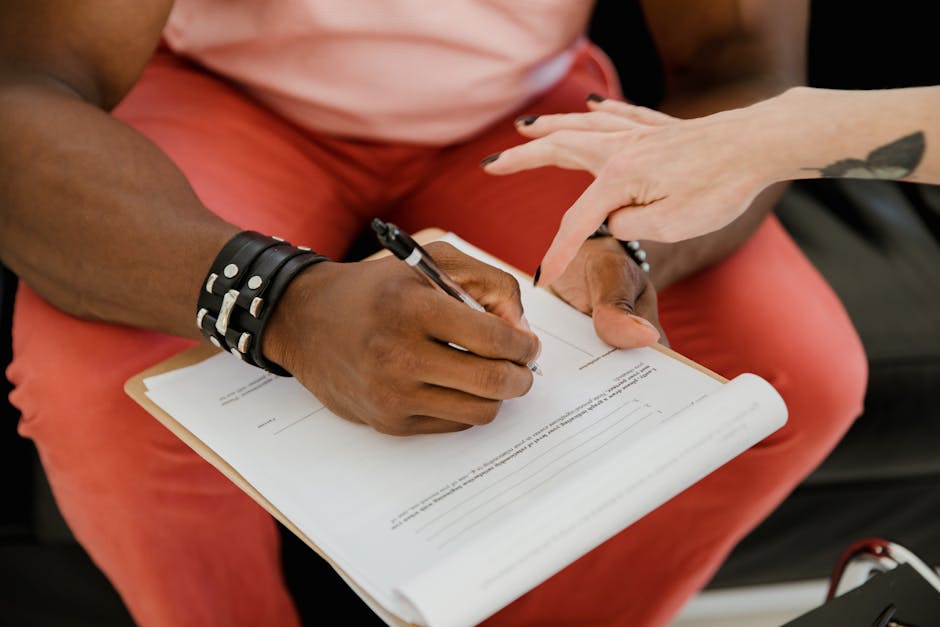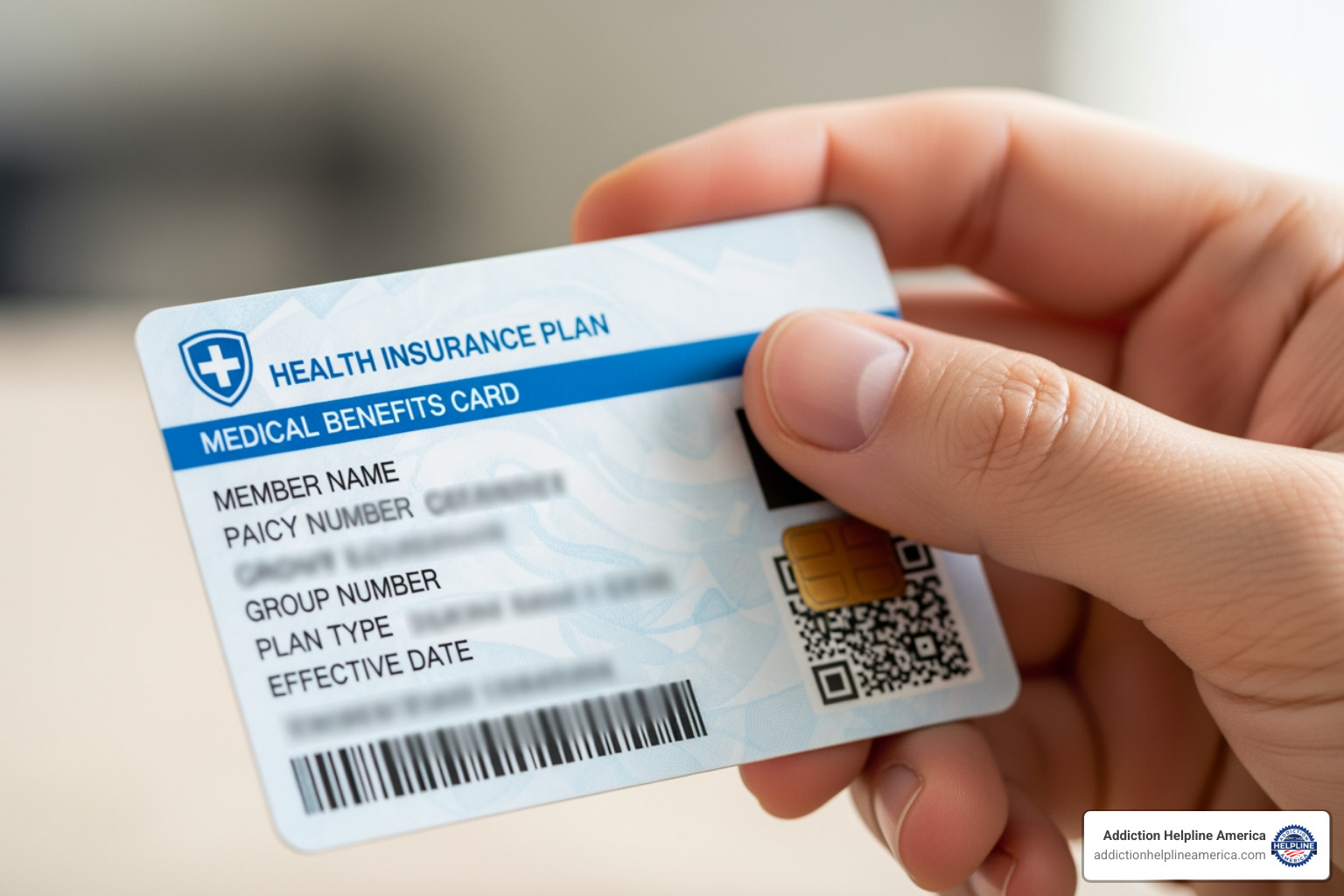
Understanding Your Options for Affordable Addiction Treatment
Are there free drug rehab centers? Yes, several types of free and low-cost drug rehab centers are available across the United States. These include:
- State-funded programs – Government-supported facilities for low-income individuals
- Non-profit organizations – Charitable centers offering sliding scale fees or scholarships
- Faith-based programs – Ministry-supported recovery centers, often at no cost
- Veterans programs – VA benefits and specialized treatment for those who served
- Medicaid-covered facilities – Treatment centers accepting government insurance
For many, the cost of addiction treatment seems like an impossible barrier. However, 45% of facilities nationwide provide free or minimal payment treatment for those who cannot afford it, and 58% offer sliding fee scales based on income. You don’t need thousands of dollars to start your recovery.
This guide covers your options, from completely free programs to low-cost alternatives. We’ll explain qualifications, services, and how to find help. Affordable recovery paths exist, even if you’re uninsured or can’t afford private treatment.
At Addiction Helpline America, we help people steer addiction treatment and find free drug rehab centers. We understand that finding affordable care is the critical first step toward lasting recovery.
Essential are there free drug rehab centers terms:
What Types of Free Drug Rehab Centers Are There?
If you’re wondering are there free drug rehab centers that can help, the answer is yes. Several types of programs make treatment accessible to people who can’t afford private care. These programs exist because communities, governments, and faith organizations recognize that addiction recovery should be available to everyone, regardless of income.
Understanding what’s available is the first step. Let’s break down the main types of free drug rehab centers, how they’re funded, and what makes each unique.
| Program Type | Funding Source | Typical Services | Eligibility Considerations |
|---|---|---|---|
| State-Funded | Federal and state tax dollars, grants | Detox, inpatient, outpatient, counseling, MAT | Low income, uninsured, residency, substance use documentation |
| Non-Profit | Donations, grants, community fundraising | Sliding scale fees, scholarships, various treatment levels | Financial need, sometimes specific demographics |
| Faith-Based | Religious organizations, donations | Spiritual guidance, counseling, 12-step, peer support | Open to all, but often incorporates religious principles |
State-Funded and Government Programs
State-funded programs are the backbone of accessible addiction treatment. They use public funding from taxes and grants to serve those who can’t afford care, managed by state behavioral health agencies to ensure everyone has a chance at recovery.
A major advantage is that many accept Medicaid, the government health insurance for low-income individuals. If you qualify, Medicaid can cover treatment that would otherwise be unaffordable. More info about Medicaid rehab can help you understand how this works.
These programs offer comprehensive, evidence-based services like medical detox, inpatient/outpatient care, counseling, and medication-assisted treatment (MAT). The care is professional, not a “lesser” option.
Be aware of potential waitlists due to high demand. However, some groups get priority, and lists can move quickly. It’s best to apply as soon as possible.
Non-Profit and Charitable Organizations
Non-profits offer another path to affordable treatment. Funded by donations, grants, and community support, their mission is healing, not profit.
They are flexible, often using sliding scale fees that adjust your cost based on your income. This makes treatment financially manageable. Many also have scholarship programs funded by donors that can cover all or part of your treatment. Always ask about financial aid, as these organizations want to help.
Many facilities offer free or minimal payment treatment for people who cannot afford traditional rehab. A significant number of centers nationwide provide these options, proving that accessible pathways to treatment exist.
Faith-Based Recovery Programs
Faith-based programs combine recovery support with spiritual guidance. Funded by ministry-based support and donations, they often provide treatment at little to no cost.
Many use 12-Step models and have strong peer support networks. For ongoing support, resources like AA Meetings: Sunrise Hybrid can provide continued connection to the recovery community.
While open to all, these programs integrate spiritual principles. This can be powerful if faith is important to you. If not, ask about the required level of participation in religious activities. Family members can also find support through resources like Al-Anon for families.
Whether government-funded, charity-driven, or faith-based, free drug rehab centers exist across the country, sharing the common goal of making recovery possible for everyone.
Navigating Eligibility and Services
Once you know the types of free drug rehab centers, the next step is determining your eligibility and the services offered. Most programs have straightforward requirements focused on need.
You’ll typically need to provide documentation like proof of residency, income verification, and information on your insurance status. An addiction severity assessment is also common to determine the right level of care. While it may seem like a lot, this paperwork ensures resources go to those most in need, and facility staff are there to help you through it.
Who qualifies for free drug rehab centers?
Eligibility for free or low-cost rehab is primarily based on financial need. Low-income individuals and uninsured persons are the main qualifiers. If you lack health insurance or struggle financially, you are likely eligible for assistance.
Government programs usually require US citizenship or legal residency proof. Certain groups often receive priority placement due to their vulnerability, including pregnant women, mothers with dependent children, and those with co-occurring mental health disorders.
Veterans are another priority group with access to specialized programs through the Department of Veterans Affairs, often at little to no cost.
Every state has programs to help residents. For example, state Medicaid programs serve qualifying residents, and youth programs may offer free counseling. If you’re helping someone else, our Getting Someone Into Rehab guide can walk you through the process.
Core Services Included in Treatment
The quality of care doesn’t depend on cost. Free and low-cost centers offer the same evidence-based treatments as private facilities. The main difference is in amenities (basic vs. luxury), not the effectiveness of the therapy.
Medical detox is often the first step, especially for alcohol, opioids, or benzodiazepines. Drug Detox provides 24/7 medical supervision for safe withdrawal.
After detox, you’ll move to inpatient (residential) or outpatient care. The choice depends on your addiction severity, home environment, and responsibilities.
Individual counseling helps you understand the root causes of your addiction, while group therapy provides connection and peer support.
Many programs offer medication-assisted treatment (MAT), which combines medications with therapy to reduce cravings and relapse risk. You can explore different approaches in our Types of Addiction Therapy guide.
Quality programs also include aftercare planning to connect you with ongoing support, relapse prevention resources, and community groups to help you maintain progress after treatment. Basic amenities like clean housing and meals are provided so you can focus on healing.
Duration of Stay in State-Funded Programs
The length of your stay in a state-funded rehab isn’t fixed. It depends on your individual progress, addiction severity, and the program’s offerings.
Short-term programs are usually 30-90 days, focusing on stabilization. Long-term residential programs can last several months for those with more severe addiction, providing more time to develop recovery skills.
Treatment duration should be flexible and individualized. Clinical staff will assess your progress and adjust your plan as needed. State-funded programs can range from 30 days to several months, so it’s worth asking about program lengths when exploring options.
Waitlists can be a hurdle, but don’t be discouraged. Many facilities offer interim support like outpatient services while you wait for an inpatient bed. Every step forward counts.
How to Find Free and Low-Cost Rehab Programs
When you’re ready for recovery, knowing where to look is key. Finding are there free drug rehab centers is easier than you might think, thanks to national directories, state resources, and crisis support systems.
Let’s walk through the most effective ways to locate these vital services.
Using National and State Directories
National and state directories are your roadmap to affordable treatment options.
Addiction Helpline America’s free, confidential treatment locator connects you with our nationwide network of centers. We offer personalized guidance to find the right program for you.
The Substance Abuse and Mental Health Services Administration (SAMHSA) also has a national treatment locator to find providers offering free or low-cost care.
Your state’s behavioral health website lists certified providers, often noting which accept Medicaid or offer sliding scales. For example, Colorado has resources like the OwnPath Care Directory and Colorado LIFTS.
Your local Department of Health and Human Services (DHHS) office can also provide information on financial aid and point you to affordable local treatment.
Special Resources for Veterans
Veterans have access to specialized support for substance use disorders designed for their unique needs.
VA benefits cover many substance use treatment programs. Costs vary, but for many veterans, treatment is low-cost or completely covered. The VA offers many treatment programs for substance use disorders worth exploring.
The VA Community Care Partners program allows you to use your benefits at approved non-VA providers if a VA facility isn’t available or suitable.
Many veterans have co-occurring disorders like PTSD. Effective treatment addresses both. Resources like Make the Connection offer peer stories and connect you with support.
The Affordable Care Act also ensures most health insurance plans cover substance use treatment, which can help veterans and their families.
Immediate Support and Crisis Lines
When you need help right now, free, 24/7 support is available.
The 988 Suicide & Crisis Lifeline offers immediate help for emotional distress, mental health, or substance use. You can call or text 988 or use the live chat at 988Colorado.com.
Walk-in crisis centers provide immediate, face-to-face support for mental health and substance use issues, regardless of your ability to pay. The 988 Colorado website lists locations.
Various organizations also operate specialized mental health hotlines. Our Mental Health Hotline information page provides additional resources.
In a life-threatening emergency, always call 911 or go to the nearest emergency room.
Affordable Alternatives and Payment Assistance
Not everyone will qualify for completely free drug rehab centers, but don’t let that stop you from seeking help. Many other pathways exist to make quality care affordable. Recovery is an investment in your life, and help should be accessible to all.
The Role of Insurance: Medicaid and Medicare
Health insurance is a key tool for affordable treatment. The Affordable Care Act (ACA) made substance use disorder treatment an essential health benefit, meaning most insurance plans must cover it.
Medicaid can be transformative, often covering most or all treatment costs for eligible individuals. In Colorado, Health First Colorado is the state’s Medicaid program. Always confirm that your chosen facility accepts Medicaid. Our complete guide to Medicaid for rehab explains how to maximize your benefits.
Medicare also helps cover treatment costs, especially for those 65 or older or with certain disabilities. As with Medicaid, verify that your chosen center accepts Medicare before beginning services.
What if I don’t qualify for free drug rehab centers?
If you don’t qualify for free programs but still find costs challenging, don’t lose hope. Many facilities offer flexible financial options.
Sliding scale fees are common, with 58% of facilities offering them. This adjusts your cost based on income. Many centers also have scholarship programs funded by donors.
Payment plans let you pay for treatment in manageable monthly installments. You can also look for private scholarships and grants from foundations that fund addiction treatment. Our team at Addiction Helpline America has compiled tips for how to pay for treatment that cover these options.
Other Financial Aid Options
Creative solutions exist beyond insurance and facility aid. Crowdfunding platforms can help you raise funds from your community. Personal loans can be a bridge to immediate treatment, though they require careful consideration. Support from family and friends, financial or otherwise, can also be invaluable.
Clinical trials may offer free or low-cost treatment as part of research. Also, check if your employer offers an Employee Assistance Program (EAP) for referrals or financial help.
The most important step is to ask. Admissions counselors are experienced in finding financial solutions and want to help you find a way forward. Our guide on Choosing the Right Rehab Facility emphasizes financial planning in your decision.
Frequently Asked Questions about Free Addiction Treatment
We know you have questions. Here are clear, straightforward answers to some of the most common ones.
What is the difference between free rehab and private rehab?
People often wonder about the differences between free and private rehab. The distinctions are mainly in funding, amenities, and wait times, not the quality of clinical care.
- Funding: Free rehabs are publicly or charitably funded, while private rehabs rely on client payments and insurance.
- Amenities: Amenities are basic in free programs (clean, safe housing) versus luxurious in private ones (resort-like settings).
- Staffing: Staff-to-patient ratios may be higher in free programs, leading to larger group sizes, but care is still provided by licensed professionals.
- Waitlists: Waitlists are more common for free programs due to high demand. Private facilities typically have faster admission.
Crucially, both settings offer the same evidence-based treatment modalities. Your commitment to recovery, not luxury amenities, is what determines success.
Are 12-step groups like AA considered rehab?
No, 12-step groups like Alcoholics Anonymous (AA) and Narcotics Anonymous (NA) are not rehab. They are peer-led support communities, not clinical treatment programs.
These groups provide vital community and emotional support for sobriety but do not offer medical detox or professional therapy. They are a powerful complement to formal treatment, not a replacement for it.
The shared experience and accountability they offer are invaluable. They are free, widely available, and have helped millions. We encourage you to explore these resources on our Addiction Recovery Support Groups page.
Can someone be forced into a free rehab program?
Yes, in many states, involuntary commitment to addiction treatment is legally possible under specific circumstances, though laws vary.
Laws like the “Marchman Act” allow courts to order mandatory treatment if a person’s substance use makes them a danger to themselves or others. This court-ordered treatment is often at a state-funded or public facility.
The legal process is strict, requiring clear evidence that the person cannot make sound decisions and is a genuine risk. This protects individual rights while allowing for crisis intervention.
If you’re considering this option, we encourage you to read our detailed Information on substance use commitment page.
Conclusion
We’ve explored the many types of are there free drug rehab centers, from state-funded and non-profit to faith-based and veteran services. The options for affordable care are more abundant than you might think.
The statistics are encouraging: 45% of facilities offer free or minimal payment treatment, and 58% use sliding fee scales. These numbers represent real hope and tangible opportunities for recovery.
The key message is that cost is not a dead end. Solutions exist, whether through state funding, Medicaid, sliding scales, or scholarships. Recovery is possible for everyone, regardless of their financial situation.
Taking the first step is the hardest part, but you don’t have to do it alone. Reaching out for help is an act of courage.
At Addiction Helpline America, we make that first step easier. Our team offers free, confidential guidance to connect you with the right program from our vast network of treatment centers. We understand your concerns and are here to help you find resources that fit your specific needs.
You and your loved ones deserve recovery. Don’t let financial barriers stop you. Take the first step today.
Find the right drug and substance abuse treatment program for you and begin your journey toward lasting recovery. We’re here to help, every step of the way.
Our helpline is 100%
free & confidential
If you or someone you care about is struggling with drug or alcohol addiction, we can help you explore your recovery options. Don’t face this challenge alone—seek support from us.
Programs
Resources
Will my insurance
cover addiction
treatment?
We're ready to help
Find the best
drug or alcohol treatment
center
Are you or a loved one struggling with addiction? Call today to speak to a treatment expert.

















